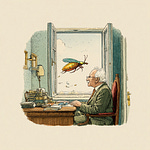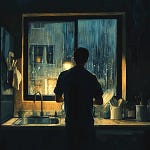It’s a test brutally fine-tuned for these times, surgically calibrated to inflict maximum pain on a generation’s fleeting attention spans, while not being actively cruel. In Jennifer Roberts’ art class at Harvard University, students are required to go to a museum, ditch their phones, find a painting and sit and stare at it. For three hours. Non-stop. Does that fill you with a little dread? Make you squirm like a worm at the thought?
Don’t worry, Roberts’ students do too. Like me, they’re accustomed to having a permanent opt-out to any fleeting sense of boredom swimming in their pockets, and also like me, there’s virtually nothing in the world we do anymore that involves such intense focus and training of one’s attention. In a world where we now hand tablets to two year olds (BTW if you ever see a toddler using a tablet, don’t get excited. They’re not geniuses. They were designed to be operable by two year olds), and mediate virtually every experience - including looking at paintings - through a screen, this might seem a bit odd. A cruel and unusual punishment.
Writer Oliver Burkeman, fascinated by this unorthodox rite of passage, was also curious as to why so many of Roberts’ students seemed to enjoy it, reporting feelings of “astonishment” at what gradually unfolded over the ordeal. So he tried it himself, gonzo-style, for his book 4000 Weeks. The first forty-five minutes or so was interminable, as you’d imagine. He shifted restlessly, glancing around the museum, trying anything but looking at his chosen painting (‘Cotton Merchants in New Orleans’, by Edgar Degas). But as his sense of time slowly faded, and he allowed himself to be absorbed in the image, an entirely different experience emerged. A different painting.
“Before long, you’re experiencing the scene in all its sensory fullness,” Burkeman writes, “the humidity and claustrophobia of that room in New Orleans, the creak of the floorboards, the taste of dust in the air.” I’m not there yet - but then again, I’ve only seen the painting on a screen, and screens have the tendency to want to move along to other things, much like a modern museum-goer (or substack reader).
Nestled in this cruel and unusual punishment is, I believe, a deeper message about our relationship with time, and how that relationship has changed with technology. I often catch myself thinking of time as a great enemy, a tyrannical clock counting down the seconds of my life like a doomsday machine. We say we’re in a race against time, a non-renewable resource to be maximised, plunging into the hustle to earn the bucks that buy us the time to claw it back and use it efficiently, wisely, well. We end up like the businessman trying to convince the itinerant fisherman to industrialise his catch, make a bunch of money, in order to have the money to spend his days…lying around on the beach.
But Burkeman’s painting shows us that time is our great friend, showing us beauty and depth if only we lend it our attention, the benevolent revealer of all things, and our mysterious teacher.
Let’s start with that derranging tyrant, the clock.
The Invention of Clocks
Humans have always cared about our relationship with celestial bodies. Ragnor Lothbrook sailed across the Northern Sea with a sundial to tell him where the sun was located, a simple device that tracked the passage of the day by casting a shadow on a thin fin affixed to one side. We would ring bells seven times a day to mark moments of prayer, upend hourglasses, or break for bread at noontide. More commonly - actually the rule for most of human history - we just let our bodies tell us what time it was. Weird to think about, that one just went to bed when tired, ate when hungry, woke when the body decided to. It sounds ridiculous, like a quickly receding dream.
That’s because we invented mechanical clocks. With clocks comes an abstracted idea of time, cut up into arbitrary chunks and wound about interconnecting cogs. We strung them up in factories and started telling the people to arrive when certain hands hit certain numbers on the clockface . It’s hard to overstate what an abrupt and revolutionary change this was. Rather than do as our internal compasses demand, we do because the clock does instead. I’m astonished to find I wake because the clock does, eat because the clock does, even - shamefully - shit because the clock does. Almost all of our activity and behavior is organised around this mode of time.
We get brief glimpses of what it was like. It’s almost bewildering when we put the clock away, when the schedule ceases to exist. I experienced it on a camping trip last year, a classic millennial ploy where I turned my phone off to feel normal for a few days. It was the strangest thing - I woke, suddenly, at dawn, to the birds and emerged trying not to worry about what time it was (though of course I did). From there, the day stretched on and on. The sun wheeled slowly overhead. At one point, I thought the day must surely be over by now, so accustomed I was to filling the hours between 1-4pm with frenetic activity and meetings. But, no - just several more hours to do whatever I pleased. By the time the sun went down, I was grateful to go to bed. I went, like Burkeman, beyond boredom and into a reverie of mere thought, forced to pay attention to the depth of nature around me.
Deep Time
It took days for me to get to that state. I had to wean my overstimulated, over-scheduled, regimented body off the clock, leaving me anxious initially as I tiptoed toward expansiveness. The bonds we have with reality are obscured as a result. The average day breaks existence down into chunks, into which we unthinkingly pour activity. The unbroken day, on the other hand, brings us closer to the ceaseless chain of what John McPhee called ‘deep time’. It forces us to pay attention to naked, unrelentling change. In this existence, we cannot ignore ourselves or our world. There is no abstraction. Writing in 1934, Lewis Mumford pondered the spiritual costs of switching to clocks:
“Time-keeping passed into time-serving and time-accounting and time-rationing. As this took place, Eternity ceased gradually to serve as the measure and focus of human actions.”
Because it’s a hobby horse of mine, I have to point out the unfair dollop of freneticism our digitial devices add to our days. Our ancestors often dwelt in deep time because they had no choice. When one set sail on a ship, that was it - if you had a letter, you had to take a gamble and pay a deliquent to deliver it for you, or chill at home while your beloved (usually a man) gadded about the high seas while we wondered what on earth they had encountered. Now we have the opposite problem. Digital communication moves with immediacy, our attention broken into tinier and tinier portions to be moved about and sold off. I would love to gad about for few days without anyone being able to reach me.
Abstract time, in other words, severs us from a sense of the eternal. It makes time feel like a monstrous entity, gleefully mocking us with hurried deadlines or interminable waiting. How else do we describe it’s tendency to speed up when we need more of it, or slow down when we’re in pain? In contrast, the eternal does nothing, expects nothing. How might we befriend such a mysterious creature?
Time is a Relationship
Our mechanical abstraction of time is arbitrary. It doesn’t really matter, for example, which celestial body you follow - the Lunar calendar is just as good as the Gregorian calendar. Yes, suggestions abound for how we could better track our relationship with the universe; for example, the Gregorian calendar, to which our entire temporal apparatus is attached, is technically three hours behind. If we wait long enough, eventually the whole system will be sufficiently out of whack that we will need to recallibrate, Zoom meetings and all. Abstractions never truly glom on to reality.
What’s more, you occupy a very specific experience of time. You are an ape of a certain size, straddling a sphere that exerts a particular gravitational pull, which gives you your sense of time. It would move slower if Earth were bigger and denser. We know that no two people ever experience the same ‘now’; that you do not comprehend reality at the same speed it occurs around you; and that concepts like ‘up’ and ‘down’ only work in your local experience. Our idea of time, in other words, is a convenience, not an objective truth. There’s a reason Einstein called it relativity.
Zooming out, our little galaxy - on which we base our Gregorian calendar - takes 230 million years to orbit the Milky Way, an impossible journey for our tiny minds to comprehend (although, by my maths, this means Earth has circled the Milky Way nearly 20 times - Sapiens have been around for perhaps 2 million years). The cosmic insignifance you might be feeling is another symptom of deep time - the nameless stretch of existence with countless observers, all experiencing something we call reality on vastly different time schedules.
I got a dose of deep time on my camping trip. I lose it when I whip out my smartphone. I think it’s the confusion we feel during Gooch Week when our normal, mechanical time is displaced. I think it’s the peace we feel in periods of total, serene absorption. Accordingly, we can use deep time to exorcise the sense that our lives are against something and reabsorb, like one of Roberts’ students, back into the world.
When we remember that time is a relationship, time loses the grip it has over us. We can choose to let time be sectioned into blocks if it serves us, when activity and deadlines propel us forward. But we should also recognise that bowing down to the clock blindfolds us from deep time, the unfolding of whatever is happening right now and into eternity. Remember this. You will feel pulled by the nose, driven by an invisible ticking, have a claustrophobic schedule and - so common with digital devices - feel maniacally beset upon because everyone has access to your sense of time.
It isn’t real. You have all the time in the world, if you let it unfold in its own, unhurried way. David Whyte wrote that, in truth, time doesn’t slip through our fingers - we slip through the fingers of time. I think what he means is that true time, deep time, is all there really is. Everything else is an abstraction. Set your attention toward the eternal and you’ll see you’ve got more than enough of it. You always did.

















